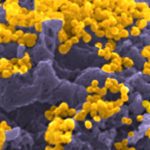Link to Pubmed [PMID] – 22547652
J. Exp. Med. 2012 May;209(5):1011-28
Delta-like ligand 4 (Dll4)-Notch signaling is essential for T cell development and alternative thymic lineage decisions. How Dll4-Notch signaling affects pro-T cell fate and thymic dendritic cell (tDC) development is unknown. We found that Dll4 pharmacological blockade induces accumulation of tDCs and CD4(+)CD25(+)FoxP3(+) regulatory T cells (T(reg) cells) in the thymic cortex. Both genetic inactivation models and anti-Dll4 antibody (Ab) treatment promote de novo natural T(reg) cell expansion by a DC-dependent mechanism that requires major histocompatibility complex II expression on DCs. Anti-Dll4 treatment converts CD4(-)CD8(-)c-kit(+)CD44(+)CD25(-) (DN1) T cell progenitors to immature DCs that induce ex vivo differentiation of naive CD4(+) T cells into T(reg) cells. Induction of these tolerogenic DN1-derived tDCs and the ensuing expansion of T(reg) cells are Fms-like tyrosine kinase 3 (Flt3) independent, occur in the context of transcriptional up-regulation of PU.1, Irf-4, Irf-8, and CSF-1, genes critical for DC differentiation, and are abrogated in thymectomized mice. Anti-Dll4 treatment fully prevents type 1 diabetes (T1D) via a T(reg) cell-mediated mechanism and inhibits CD8(+) T cell pancreatic islet infiltration. Furthermore, a single injection of anti-Dll4 Ab reverses established T1D. Disease remission and recurrence are correlated with increased T(reg) cell numbers in the pancreas-draining lymph nodes. These results identify Dll4-Notch as a novel Flt3-alternative pathway important for regulating tDC-mediated T(reg) cell homeostasis and autoimmunity.

